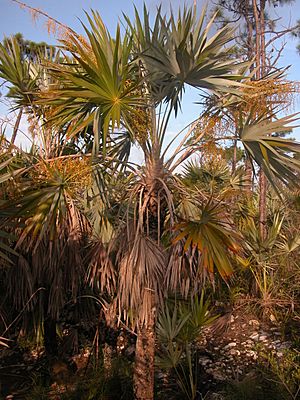Key thatch palm facts for kids
Quick facts for kids Key thatch palm |
|
|---|---|
 |
|
| Leucothrinax morrisii in the Florida Keys. Photo by Carl E. Lewis. | |
| Scientific classification |
|
| Kingdom: | Plantae |
| Clade: | Tracheophytes |
| Clade: | Angiosperms |
| Clade: | Monocots |
| Clade: | Commelinids |
| Order: | Arecales |
| Family: | Arecaceae |
| Subfamily: | Coryphoideae |
| Tribe: | Cryosophileae |
| Genus: | Leucothrinax C.Lewis & Zona |
| Species: |
L. morrisii
|
| Binomial name | |
| Leucothrinax morrisii (H.Wendl.) C.Lewis & Zona
|
|
| Script error: The function "autoWithCaption" does not exist. | |
| Synonyms | |
|
Thrinax morrisii H.Wendl. |
|
Script error: No such module "Check for conflicting parameters".
The Leucothrinax morrisii, also known as the Key thatch palm, is a small palm tree. It grows naturally in the Greater Antilles, the northern Lesser Antilles, The Bahamas, and the Florida Keys.
Before 2008, this palm was called Thrinax morrisii. Scientists later studied its family tree (called phylogenetic studies). They found it was different enough to be in its own group. So, it was given a new genus name, Leucothrinax. The name Leucothrinax comes from "leuco," meaning whitish. This refers to the white color of its flower stalks and the underside of its leaves.
Contents
What Is the Key Thatch Palm Called?
The Leucothrinax morrisii has several common names. In the United States, people call it the "Key thatch palm" or the "brittle thatch palm."
Other names for this palm include:
- "Broom palm" or "buffalo-top" in Anguilla
- Miraguano in Cuba
- Palma de escoba in Puerto Rico
- "Small-fruited thatch palm"
- Yaray
- Pandereta
- Palma de petate
- Palma de cogollo
- Guano de sierra
- Palmita
Key Thatch Palm Description
The Key thatch palm is a type of fan palm. This means its leaves spread out like a fan. It has a single stem that is usually brown or grey. These stems can grow from 1–11 metres (3–36 ft) tall. They are about 5–35 centimetres (2–14 in) wide.
The leaves of the palm are a pale blue-green or yellow-green color. The underside of the leaves looks whitish. The leaf stalks, called petioles, are 27–84 cm (0.9–2.8 ft) long. The parts of the leaf that make up the fan, called leaflets, are 33–75 cm (1.1–2.5 ft) long. They are also 2.3–4.8 cm (1–2 in) wide.
The palm's flowers grow on stalks called inflorescences. These stalks can be 55–100 cm (1.8–3.3 ft) long and stick out beyond the leaves. The fruit of the Key thatch palm starts white. As it gets older, it turns yellow.
Where Does the Key Thatch Palm Grow?
The Key thatch palm is found in several places. It grows naturally in the Florida Keys and Trinidad and Tobago. You can also find it in The Bahamas, Cuba, Hispaniola, Puerto Rico, Navassa Island, Anguilla, and Barbuda.
This palm likes to grow in dry areas. It is often found in dry forests and scrublands. It also grows near coastlines. In the Florida Keys, it lives at the edge of hardwood hammocks and in pinelands. In Puerto Rico, it grows on cliffs and on limestone or ultramafic ridges. The Key thatch palm can handle dry weather and a lot of salt spray from the ocean.
How People Use the Key Thatch Palm
People use different parts of the Key thatch palm. The stems of the plant are used to make poles. The leaves are very useful for thatch, which is a material used for roofs. The leaves are also used for weaving things like mats or baskets.
See also
 In Spanish: Leucothrinax para niños
In Spanish: Leucothrinax para niños

